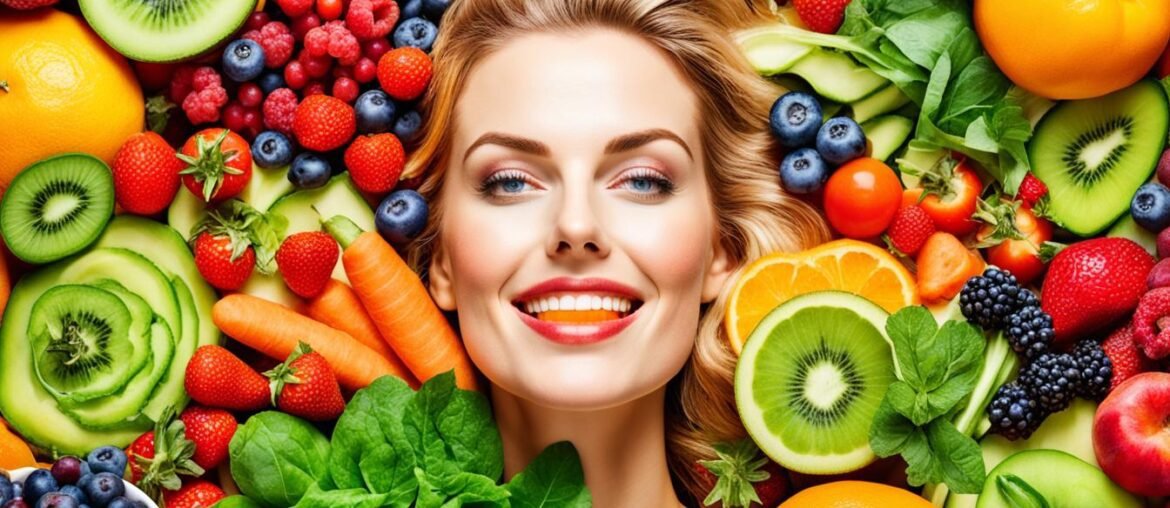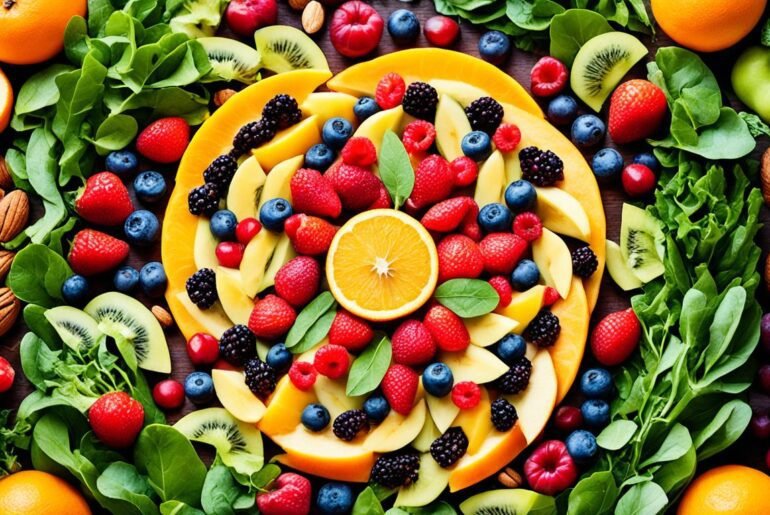Did you know that your diet has a direct impact on the health and appearance of your skin? It’s true! The foods you eat play a crucial role in maintaining a clear, radiant complexion. By incorporating specific nutrients into your daily meals, you can nourish your skin from the inside out and achieve a healthy glow.
Key Takeaways:
- Optimal nutrition is essential for healthy skin.
- Incorporate nutrient-rich foods into your diet for glowing skin.
- Essential nutrients like vitamins and minerals promote skin health.
- A balanced diet contributes to a clear and youthful complexion.
- Proper nutrition is as important as skincare products for skin care.
Protect Yourself from the Sun
One of the most important ways to care for your skin is by protecting it from the sun. Prolonged sun exposure can lead to the development of wrinkles, age spots, and even skin cancer. To safeguard your skin from harmful UV rays, follow these tips based on factual data:
- Wear Sunscreen: Apply a broad-spectrum sunscreen with an SPF of 30 or higher every day, even on cloudy days. Reapply every two hours, or more often if sweating or swimming.
- Seek Shade: Avoid direct sun exposure during peak hours, typically between 10 a.m. and 4 p.m. If you’re outside, try to stay in the shade or create your own shade with an umbrella or wide-brimmed hat.
- Wear Protective Clothing: Cover your skin with long-sleeved shirts, pants, and wide-brimmed hats. Look for clothing with a UPF (Ultraviolet Protection Factor) rating for extra sun protection.
- Protect Your Eyes: Wear sunglasses that block 100% of UVA and UVB rays to protect your eyes and the delicate skin around them.
- Avoid Tanning Beds: Tanning beds emit harmful UV radiation, which can increase your risk of skin cancer. Opt for safer alternatives like self-tanners or spray tans if you desire a bronzed look.
“Protecting your skin from the sun is crucial for maintaining its health and preventing sun damage. Incorporate these sun protection tips into your daily routine to keep your skin looking youthful and reduce the risk of skin cancer.”
Remember, protecting yourself from the sun should be a priority throughout the year, not just during the summer months. By taking these preventive measures, you can enjoy time outdoors while keeping your skin safe and healthy.
Quit Smoking

Smoking has a detrimental impact on skin health and can accelerate the aging process, leading to the development of wrinkles and fine lines. The chemicals in cigarettes narrow the blood vessels in the outer layers of the skin, reducing blood flow and depriving the cells of oxygen and essential nutrients. As a result, the skin becomes dull, dry, and prone to damage.
Moreover, smoking damages collagen and elastin, the proteins that provide structure and elasticity to the skin. Collagen and elastin fibers break down, causing the skin to lose its firmness and resilience. This leads to sagging skin and the formation of wrinkles.
Not only does smoking impact the appearance of the skin, but it also increases the risk of developing skin cancer. Among the various types of skin cancer, smoking is particularly associated with squamous cell carcinoma, a type of non-melanoma skin cancer that can be aggressive and spread to other parts of the body.
If you are a smoker, the best thing you can do to protect your skin and overall health is to quit smoking. By quitting, you can prevent further damage to your skin, improve its appearance, and reduce your risk of developing skin cancer.
Quitting smoking is a challenging process that requires determination and support. Seek assistance from healthcare professionals, join support groups, or consider nicotine replacement therapy to help you quit successfully. By making the decision to quit smoking, you are taking a significant step towards improving your skin’s health and your overall well-being.
Treat Your Skin Gently
Taking care of your skin involves treating it with the utmost kindness and adopting proper cleansing practices. By following these tips based on factual data, you can maintain the health and vitality of your skin:
- Daily cleansing: Cleanse your skin thoroughly but gently every day to remove impurities and excess oil. Use a mild cleanser that suits your skin type and avoid scrubbing too forcefully, as it can cause irritation.
- Avoid hot water: When cleansing your face or body, use lukewarm water instead of hot water. Hot water can strip away natural oils and leave your skin feeling dry and tight.
- Choose gentle soaps: Opt for mild, fragrance-free soaps that are specifically formulated for sensitive skin. Strong soaps can disrupt the skin’s natural barrier and lead to dryness or irritation.
- Shave carefully: For those who shave, make sure to take precautions to minimize skin irritation. Use a sharp razor and apply a shaving cream or gel to create a protective barrier. Shave in the direction of hair growth to reduce the risk of razor bumps or ingrown hairs.
- Moisturize dry skin: After cleansing or shaving, apply a moisturizer to lock in moisture and keep your skin hydrated. Look for products that contain ingredients like hyaluronic acid or ceramides, which help to retain moisture.
Remember, treating your skin gently is key to maintaining its health and preventing any potential damage. By following these tips, you can ensure your skin stays fresh, supple, and radiant.
Eat a Healthy Diet
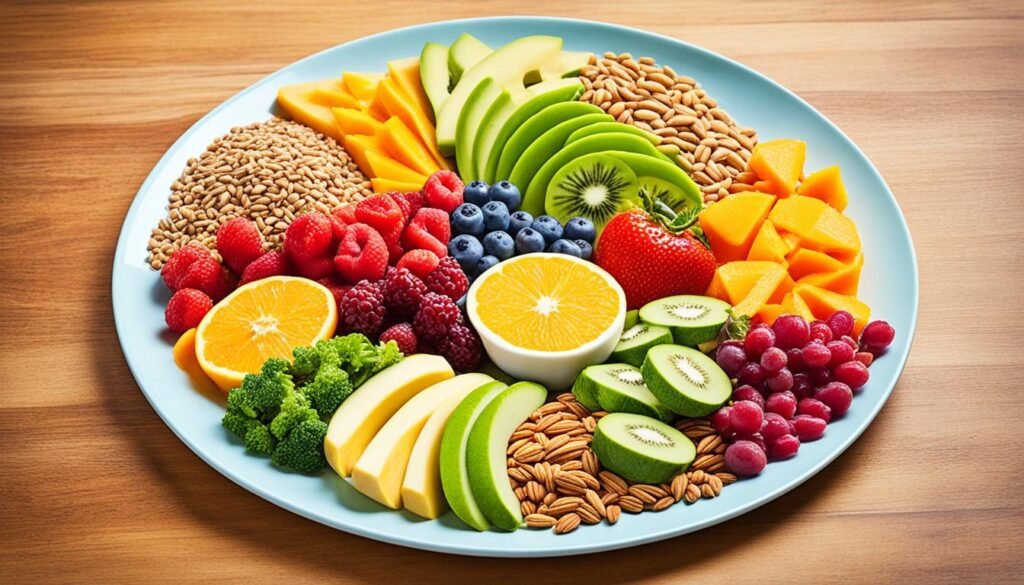
Incorporating a healthy and balanced diet into your lifestyle is not only beneficial for your overall well-being but also plays a crucial role in maintaining healthy skin. A diet rich in fruits, vegetables, whole grains, lean proteins, and healthy fats can provide your skin with essential nutrients that promote its health and vitality.
- Fruits and Vegetables: Include a variety of colorful fruits and vegetables in your meals. They are packed with vitamins, minerals, and antioxidants that help protect your skin from damage caused by free radicals and promote a youthful complexion.
- Whole Grains: Opt for whole grain options like brown rice, quinoa, and whole wheat bread. These are high in fiber and provide a steady release of energy, supporting overall skin health.
- Lean Proteins: Incorporate lean proteins such as chicken, turkey, fish, tofu, and legumes into your diet. These are excellent sources of amino acids, which are the building blocks for collagen and elastin, essential proteins for maintaining skin elasticity.
- Healthy Fats: Include sources of healthy fats such as avocados, nuts, seeds, and fatty fish like salmon. These fats provide essential fatty acids, which help keep your skin hydrated and supple.
It’s important to note that while healthy fats are beneficial for your skin, it’s best to limit your intake of unhealthy fats found in fried foods and processed snacks. These fats can contribute to inflammation and skin problems.
Remember to stay hydrated by drinking an adequate amount of water throughout the day. Water helps flush out toxins from your body and keeps your skin hydrated from within.
By incorporating these nutritious foods into your diet, you can nourish your skin from the inside out and promote a healthy, glowing complexion.
| Food Group | Examples |
|---|---|
| Fruits | Strawberries, oranges, apples |
| Vegetables | Spinach, kale, carrots |
| Whole Grains | Brown rice, quinoa, whole wheat bread |
| Lean Proteins | Chicken, turkey, fish |
| Healthy Fats | Avocado, nuts, seeds |
Manage Stress
Stress can have a significant impact on your skin’s health and contribute to various skin problems. When we experience stress, our body releases stress hormones like cortisol, which can increase oil production and lead to clogged pores, resulting in acne breakouts. Additionally, stress can exacerbate skin conditions such as eczema, psoriasis, and rosacea, making them more difficult to manage.
To maintain a healthy state of mind and promote clear, glowing skin, it’s essential to manage stress effectively. Prioritizing self-care and incorporating relaxation techniques into your daily routine can make a significant difference. Here are some proven stress management strategies based on factual data:
- Sleep: Getting enough quality sleep is crucial for managing stress and promoting overall well-being. Aim for 7-9 hours of uninterrupted sleep each night to allow your body and mind to rejuvenate.
- Exercise: Engaging in regular physical activity helps release endorphins, which are known as “feel-good” hormones. Exercise also promotes better sleep, reduces anxiety, and improves overall mental health.
- Practice relaxation techniques: Incorporate relaxation techniques such as deep breathing, meditation, and yoga into your daily routine. These practices help calm the mind, reduce stress levels, and promote a sense of inner peace.
- Engage in hobbies: Dedicate time to activities that bring you joy and help you unwind. Whether it’s reading, painting, gardening, or playing a musical instrument, hobbies provide a healthy escape from daily stressors.
- Connect with loved ones: Maintaining strong relationships and social connections is crucial for managing stress. Regularly spend time with friends and family, engage in meaningful conversations, and seek emotional support when needed.
- Set boundaries: Learn to say no and establish healthy boundaries to avoid overcommitment and excessive stress. Use your time and energy wisely by prioritizing tasks and activities that align with your goals and values.
Remember, managing stress is not only beneficial for your skin but also for your overall well-being. By adopting these stress management strategies, you can promote a healthier state of mind and nurture your skin’s natural radiance.
Embedding relaxation techniques and self-care practices into your daily routine can help manage stress effectively, leading to healthier skin and a more balanced lifestyle.
Vitamin-Rich Foods for Skin Health
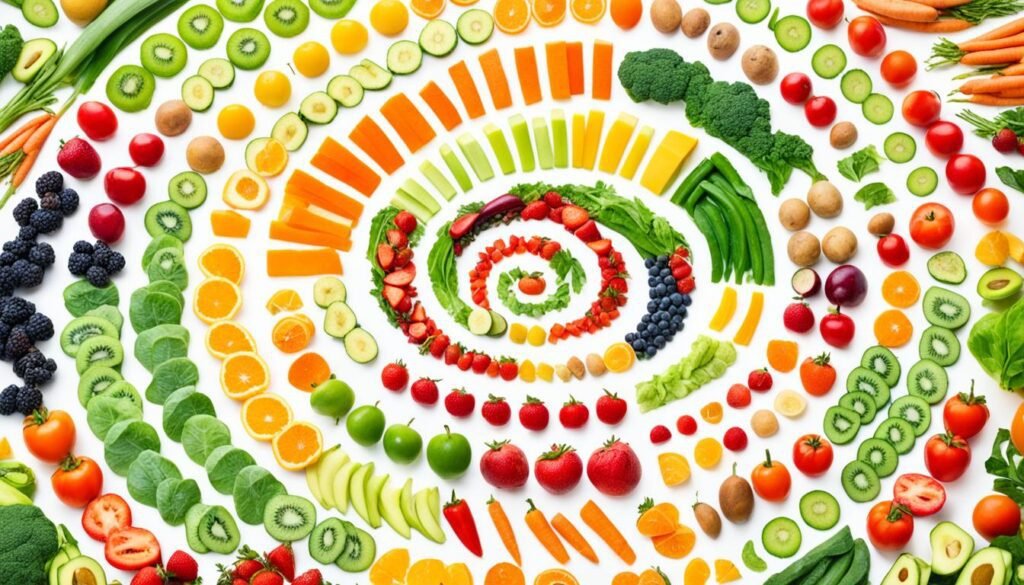
Including specific vitamins in your diet can greatly benefit your skin. These essential nutrients play a key role in maintaining the health and vitality of your skin. By incorporating foods rich in these vitamins into your daily meals, you can nourish your skin from within and achieve a glowing complexion. Here are some important vitamins and their food sources, based on factual data:
Vitamin A
Vitamin A is crucial for skin health, as it helps in the production of new skin cells and protects against damage. Including foods rich in vitamin A can help keep your skin smooth and radiant. Here are some excellent sources of vitamin A:
- Carrots
- Sweet potatoes
- Kale
- Mangoes
Vitamin C
Vitamin C is well-known for its antioxidant properties and its role in collagen synthesis. It helps promote the production of collagen, which keeps the skin firm and reduces the appearance of fine lines and wrinkles. Boost your vitamin C intake with these foods:
- Citrus fruits (oranges, lemons, grapefruits)
- Berries (strawberries, blueberries, raspberries)
- Bell peppers
- Kiwi
Vitamin E
Vitamin E is an antioxidant that helps protect the skin from damage caused by free radicals. It also plays a role in maintaining skin hydration and elasticity. Include these vitamin E-rich foods in your diet:
- Almonds
- Sunflower seeds
- Spinach
- Avocado
Selenium
Selenium is a trace mineral that works alongside antioxidants to protect the skin. It helps to reduce inflammation and enhance the skin’s natural defense mechanisms. Here are some selenium-rich foods:
- Brazil nuts
- Tuna
- Oysters
- Whole grains
Zinc
Zinc is an essential mineral that promotes skin healing and reduces inflammation. It also helps regulate oil production, making it beneficial for acne-prone skin. Boost your zinc levels with these foods:
- Oysters
- Pumpkin seeds
- Beef
- Legumes
Phyto-estrogens
Phyto-estrogens are plant compounds that have a similar structure to estrogen and can help balance hormone levels in the body. This can have a positive impact on the skin, especially for women experiencing menopausal skin changes. Some sources of phyto-estrogens include:
- Soybeans
- Flaxseeds
- Chickpeas
- Red clover
By incorporating these vitamin-rich foods into your diet, you can provide your skin with the essential nutrients it needs to stay healthy and vibrant. Remember to consult with a healthcare professional or registered dietitian for personalized advice based on your specific health needs.
Healthy Fats for Skin Nourishment
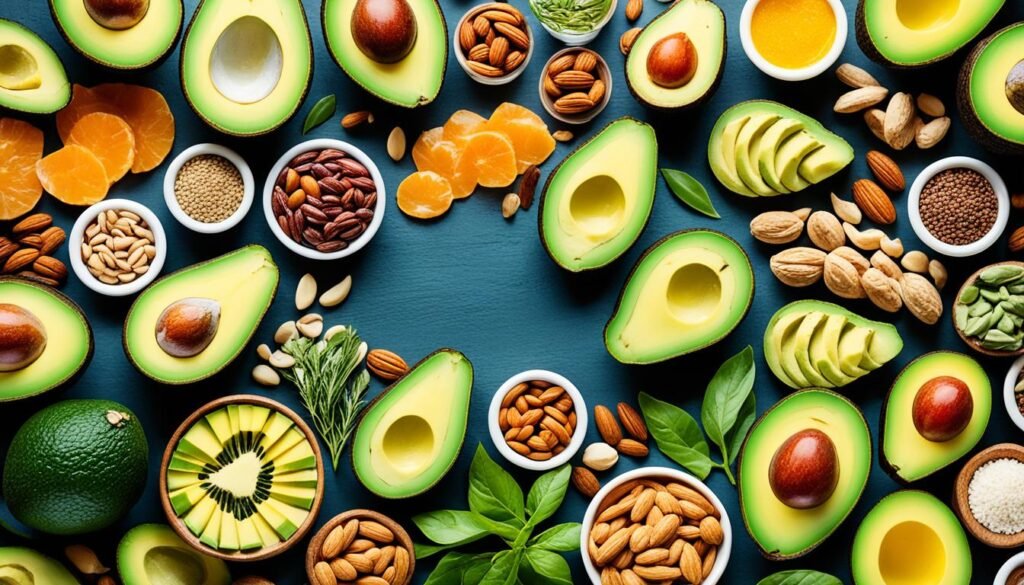
When it comes to nourishing your skin from within, healthy fats are essential. These fats provide the building blocks for maintaining skin integrity and promoting a healthy complexion. Incorporating foods rich in essential fatty acids, such as omega-3 and omega-6, into your diet can work wonders for your skin’s health.
Avocados are a fantastic source of healthy fats that can benefit your skin. They are loaded with monounsaturated fats that help keep your skin moisturized and supple. Additionally, avocados contain vitamin E, an antioxidant that protects your skin from damage caused by free radicals.
Oily fish, such as salmon, mackerel, and sardines, are also excellent sources of healthy fats. These fish are rich in omega-3 fatty acids, which have anti-inflammatory properties and can help soothe skin conditions like acne and eczema. Omega-3 fats also play a role in maintaining the skin’s barrier function, keeping it hydrated and protected.
Adding a variety of nuts and seeds to your diet is another way to boost your intake of healthy fats. Walnuts, flaxseeds, and chia seeds are particularly beneficial, as they are packed with omega-3 fatty acids and other nutrients that promote skin health. These nuts and seeds also provide essential minerals like selenium and zinc, which support collagen production and help maintain the skin’s elasticity.
Finally, incorporating healthy oils, such as olive oil and coconut oil, into your cooking and salads can provide your skin with nourishing fats. Olive oil is rich in monounsaturated fats and antioxidants, while coconut oil is known for its moisturizing properties and antibacterial benefits.
To summarize, including avocados, oily fish, nuts, seeds, and healthy oils in your diet can provide your skin with the essential fatty acids it needs. These fats help maintain skin integrity, promote hydration, and protect against inflammation, resulting in healthier, more radiant skin.
Hydration for Healthy Skin
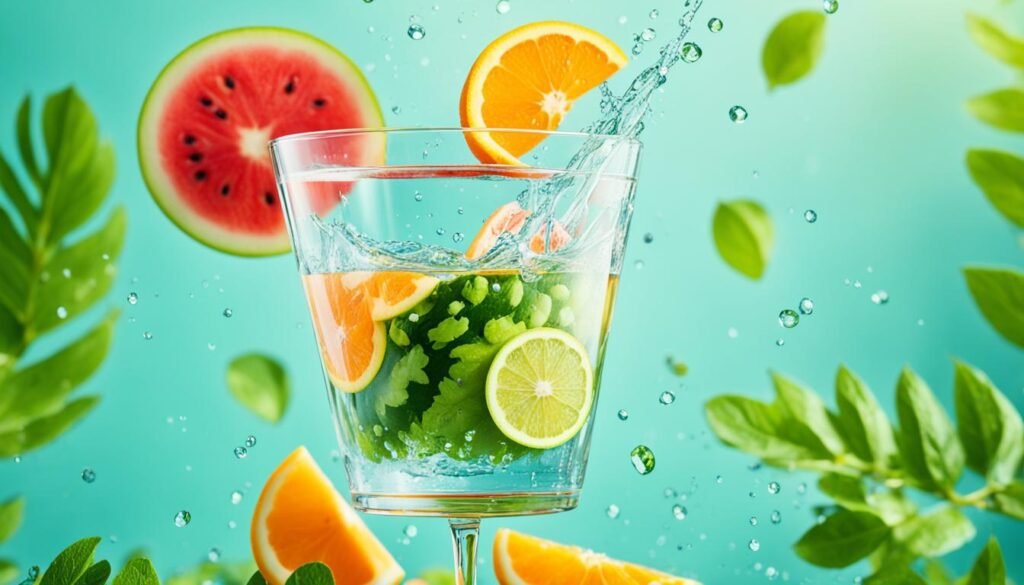
Proper hydration is essential for maintaining healthy and vibrant skin. Hydrated skin not only looks more radiant but also functions optimally to protect against external aggressors. Here are some tips based on factual data to keep your skin well-hydrated:
1. Water Intake
Stay hydrated by drinking an adequate amount of water throughout the day. The recommended daily intake is typically around 8 cups (64 ounces) of water, but individual needs may vary based on factors such as climate and physical activity level.
2. Hydration from Food
Aside from drinking water, you can also increase hydration levels by consuming water-rich fruits and vegetables. These foods not only provide moisture but also deliver essential vitamins, minerals, and antioxidants that promote skin health. Incorporate the following options into your diet:
| Water-Rich Fruits | Water-Rich Vegetables |
|---|---|
| Watermelon | Cucumbers |
| Oranges | Tomatoes |
| Grapes | Bell Peppers |
3. Hydration Benefits
Maintaining proper hydration offers numerous benefits for your skin:
- Moisture Retention: Well-hydrated skin retains moisture better and appears plump and supple.
- Improved Elasticity: Hydrated skin is more elastic, making it less prone to fine lines and wrinkles.
- Natural Glow: Hydration enhances the natural radiance of your skin, giving it a healthy glow.
- Enhanced Skin Barrier: A well-hydrated skin barrier is more effective at protecting against environmental aggressors.
By prioritizing hydration through water intake and consuming water-rich foods, you can maintain optimal skin health and achieve a glowing complexion.
Conclusion
Incorporating a healthy diet into your skincare routine is crucial for achieving radiant and blemish-free skin. By following these diet tips based on factual data, you can provide your skin with the essential nutrients it needs, improve skin health, and promote a clear complexion.
Remember to protect your skin from the sun by using broad-spectrum sunscreen and limiting sun exposure. Quit smoking to prevent premature aging, wrinkles, and skin cancer. Treat your skin gently through daily cleansing with mild products and moisturize dry skin regularly.
Eating a well-balanced diet that includes fruits, vegetables, whole grains, lean proteins, and healthy fats, such as avocados and oily fish, will provide optimal nutrition for your skin. Additionally, managing stress and staying hydrated are crucial for maintaining healthy skin.
By prioritizing these healthy diet tips for skin care, you can nourish your skin from within and achieve a radiant complexion. Take care of your skin, and it will reward you with a clear and glowing appearance.
FAQ
How does sun exposure affect the skin?
Prolonged sun exposure can lead to the development of wrinkles, age spots, and even skin cancer.
Does smoking impact skin health?
Yes, smoking negatively impacts skin health and can contribute to premature aging and wrinkles, as well as increase the risk of skin cancer.
How should I treat my skin gently?
Treat your skin gently by avoiding hot water, strong soaps, and harsh cleansing techniques. Moisturizing dry skin is also important.
What should I include in a healthy diet for skin health?
A healthy diet for skin health should include fruits, vegetables, whole grains, lean proteins, and healthy fats while avoiding unhealthy fats and processed carbohydrates, and staying hydrated with water.
How can I manage stress for better skin health?
Managing stress is important for skin health. Strategies such as getting enough sleep, practicing relaxation techniques, and maintaining a healthy state of mind can help.
Which vitamins are important for skin health?
Vitamins A, C, and E, as well as selenium, zinc, and phytoestrogens, are important for skin health and can be obtained from certain foods.
What are some sources of healthy fats for skin nourishment?
Avocados, oily fish, nuts, seeds, and oils are good sources of healthy fats, including omega-3 and omega-6 fatty acids, which nourish the skin from within.
How does hydration affect skin health?
Proper hydration is essential for maintaining healthy and vibrant skin. Hydration can be obtained from both water intake and water-rich fruits and vegetables.
How can I achieve radiant and blemish-free skin?
By following these diet tips, you can provide your skin with the essential nutrients it needs, improve skin health, and promote a clear complexion.

